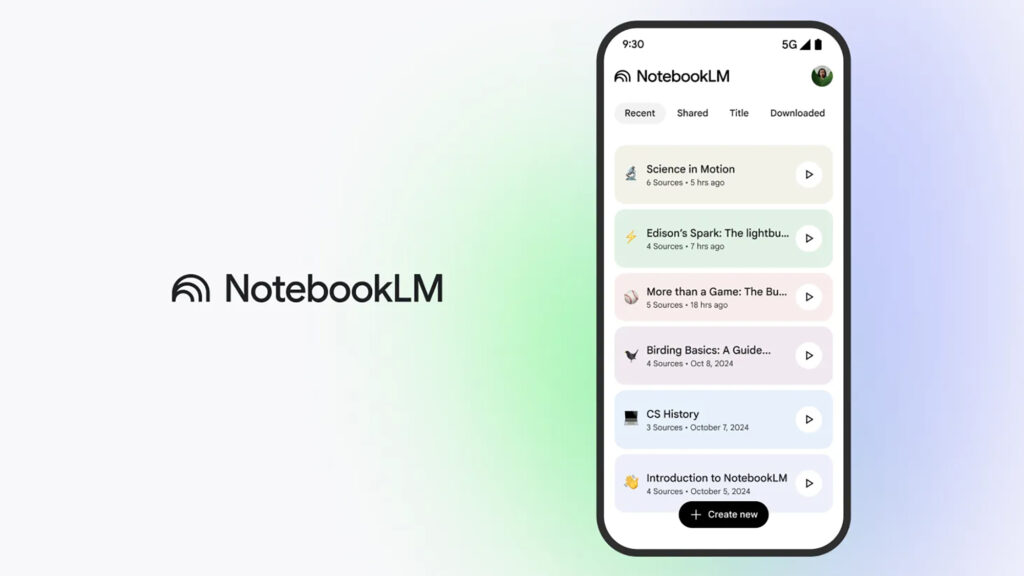Introducing NotebookLM: Google’s AI-Powered App for Research and Study
In the midst of the recent flurry of AI advancements and product launches from Google, one app that may have slipped under the radar is NotebookLM. This app, powered by advanced language models, is a valuable tool for research and study.
Initially designed as an academic research tool in 2023, NotebookLM has now become more consumer-friendly with official apps available for Android, iOS, and the web. While it may not have the same polished interface as Google Gemini, NotebookLM offers a unique set of features that make it stand out.
NotebookLM revolves around the concept of notebooks, which are collections of sources such as text, PDFs, MP3 files, YouTube links, Google Docs, and web pages. The app analyzes these sources, providing summaries and answering questions based on the information gathered.
To create your first notebook on Android, simply tap "Create New" on the home screen and add sources from your device or the web. While the mobile version has some limitations in terms of supported sources, you can still import PDFs, websites, YouTube links, and copied text.
Once your sources are imported, you can view them in the notebook interface. The app automatically generates a summary based on the imported content. You can then ask questions about the sources in the "Chat" tab and receive detailed responses with citations.
One of NotebookLM’s standout features is the ability to generate AI-hosted podcasts called "Audio Overviews" for each notebook. These podcasts provide a conversational summary of the sources, narrated by AI characters. You can start generating an Audio Overview by tapping the button in the Chat window or in the Studio tab.
The podcast production process may take some time, but you can continue using the app or switch to other tasks while it completes. Once the podcast is ready, you can listen to it in the Studio tab and even interact with the AI hosts by asking questions or making comments.
The web version of NotebookLM offers additional features like study guides, timelines, FAQs, and briefing documents. Google is continuously updating the app, with more features like video overviews on the way.
In conclusion, NotebookLM is a versatile tool that leverages AI technology to simplify research and study tasks. Whether you’re a student, researcher, or just someone looking to gather and analyze information, NotebookLM offers a unique and powerful solution for organizing and synthesizing data. H1: The Benefits of Gardening for Mental Health
H2: Introduction
Gardening is not just a hobby; it can also have a positive impact on your mental health. Engaging in gardening activities can help reduce stress, improve mood, and increase overall well-being. In this article, we will explore the various benefits of gardening for mental health.
H2: Stress Reduction
One of the primary benefits of gardening for mental health is stress reduction. Spending time in nature and tending to plants can help lower cortisol levels, the hormone responsible for stress. The physical activity involved in gardening also releases endorphins, which are known as the "feel-good" hormones that can improve mood and reduce anxiety.
H2: Mood Enhancement
Gardening has been shown to have a positive impact on mood. The act of caring for plants and watching them grow can bring a sense of accomplishment and satisfaction. In addition, being surrounded by greenery and flowers can create a calming and peaceful environment, which can help improve overall well-being.
H2: Mindfulness and Relaxation
Gardening can also promote mindfulness and relaxation. Focusing on the task at hand, whether it’s planting seeds, watering plants, or weeding, can help you stay present in the moment and clear your mind of worries and distractions. This meditative aspect of gardening can help reduce rumination and promote a sense of calm.
H2: Physical Health Benefits
In addition to its mental health benefits, gardening can also have positive effects on physical health. The physical activity involved in gardening, such as digging, planting, and weeding, can help improve strength, flexibility, and cardiovascular health. Spending time outdoors in the sun can also boost vitamin D levels, which is essential for overall health.
H2: Conclusion
In conclusion, gardening is not only a rewarding hobby but also a powerful tool for improving mental health. From stress reduction to mood enhancement to promoting mindfulness, gardening offers a wide range of benefits for the mind and body. So, next time you’re feeling stressed or overwhelmed, consider spending some time in the garden to reap the many rewards it has to offer.

